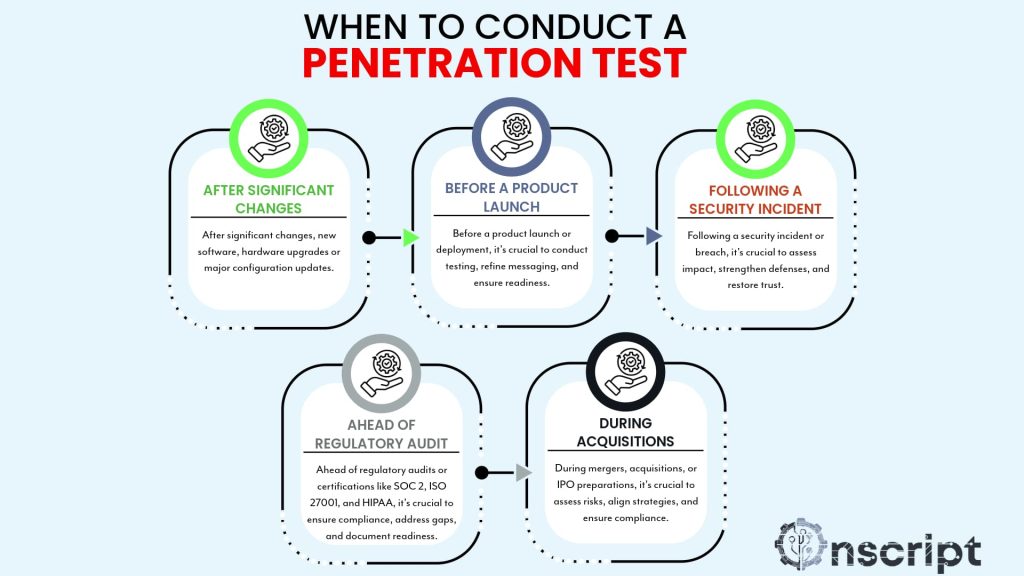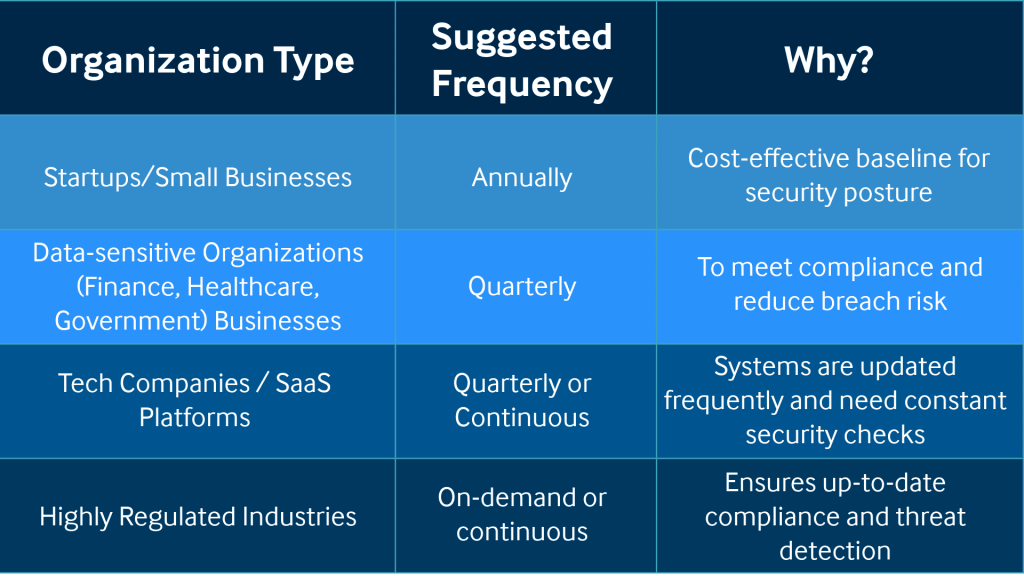Protecting What Matters Most - Onscript
Why Every Business needs a penetration test
Date: 10 June 2025
In today’s evolving threat landscape, it’s no longer enough to have firewalls and antivirus software in place. Cybercriminals are constantly finding new ways to break into systems, exploit weaknesses, and steal sensitive data. One powerful way to stay ahead is by conducting professional penetration testing for small businesses and enterprises alike.
What Is Penetration Testing?
Penetration testing, or ethical hacking, involves simulating a cyberattack on your network, website, or system to identify potential vulnerabilities before real hackers do. It’s a proactive approach to finding weak spots from misconfigured systems to outdated software and insecure endpoints.
Why Businesses Are Vulnerable Without A Penetration Test
Many businesses especially startups and small to mid sized companies operate under the false assumption that cyberattacks are something that only happen to big corporations. But in reality, cybersecurity threats targeting small businesses are rising rapidly because attackers know these companies often have weaker defenses.
Here are some common vulnerabilities that make companies easy targets:
Using Outdated Applications
Outdated software is one of the most exploited entry points in a cyberattack. Hackers actively scan networks for known vulnerabilities in older versions of commonly used platforms. Without regular patching and updates, your systems remain exposed to threats that have already been solved just not by you. Regular penetration testing for outdated software vulnerabilities can uncover these gaps before attackers do.Lacking Proper Access Controls
Many businesses neglect to enforce role based access control or fail to monitor who has access to what. This means unauthorized individuals either internally or externally may gain access to sensitive information. Poor access control remains one of the key drivers of data breaches, especially in hybrid or remote workplaces where devices are used across multiple locations.Relying Solely on Antivirus Software
While antivirus tools are a necessary layer of defense, they are no longer sufficient on their own. Modern cyber threats like zero day attacks, social engineering, and fileless malware can bypass traditional antivirus systems. A comprehensive cybersecurity strategy for small businesses must include deeper security audits, like penetration testing, to reveal vulnerabilities traditional tools miss.Failing to Test Defenses Regularly
Cybersecurity is not a set it and forget it operation. Threats evolve, and so should your defenses. Businesses that do not schedule regular network vulnerability assessments end up reacting to breaches rather than preventing them. This reactive approach is not only costly it can also ruin your reputation and break customer trust.

When Is the Best Time to Conduct a Penetration Test?
There’s no universal schedule that fits all organizations, but timing matters. The ideal time to conduct a penetration test often depends on the following scenarios:
After Significant Changes: Any major updates like new software, hardware, configuration changes, patch deployments, or infrastructure redesign can introduce new vulnerabilities. A pen test should follow these changes.
Before a Product Launch or Deployment: If you’re releasing a new app, platform, or system, ensure it’s secure before going live.
After a Security Incident: If you’ve recently experienced a breach, a pen test can help assess the damage and evaluate whether vulnerabilities were properly remediated.
Prior to Regulatory Audits or Certifications: Testing before compliance audits (e.g., SOC 2, ISO 27001) helps ensure you’re meeting security requirements.
During M&A or IPO Preparations: As part of due diligence, penetration testing is often required to validate the security posture of assets involved.
How Often Should You Conduct Penetration Testing?
The frequency of penetration testing depends on factors such as data sensitivity, regulatory requirements, and system complexity.
General Guidelines:

What Factors Influence the Timing of Penetration Testing?
Several factors should shape your testing strategy:
Data Sensitivity: The more sensitive the data you handle, the more frequently you should test.
Rate of System Changes: Constant updates increase the risk of new vulnerabilities.
Risk Tolerance: Organizations with lower tolerance for risk should test more often.
Compliance Requirements: Regulatory frameworks may dictate minimum testing frequency.
Pentest Scope and Type: Choose between black box (no prior knowledge), white box (full knowledge), or grey box testing, depending on your needs and budget.
Resources Available: Consider time, personnel, and financial investment.
Key Benefits of Regular Penetration Testing
Investing in routine penetration testing services for your business isn’t just about finding weaknesses it’s about building a secure, resilient digital foundation that helps your company grow with confidence. Let’s break down the key benefits:
- Detect Vulnerabilities Early Before Hackers Do
By scheduling regular penetration testing, you gain the ability to identify cybersecurity vulnerabilities in your system before they’re exploited. These vulnerabilities could include anything from misconfigured firewalls to outdated CMS plugins or weak employee credentials.
Think of it as a health check for your network just as regular medical exams catch problems before they become serious, regular cybersecurity testing for SMEs and startups helps detect and fix flaws before they result in costly breaches. Maintain Compliance with Industry Standards
Many industries require periodic security assessments to comply with regulations such as:HIPAA (for healthcare)
PCI-DSS (for businesses handling credit card payments)
GDPR (for organizations dealing with EU customer data)
ISO 27001 (for information security management)
With Onscript’s compliance-ready penetration testing services, we ensure that your business aligns with both legal and industry-specific standards. This helps avoid regulatory fines and positions your company as one that takes data security seriously.
Reduce the Risk of Data Breaches and Security Incidents
The average cost of a data breach for small businesses can range from $120,000 to $1.2 million, depending on the scale of the incident and the data involved. Regular penetration testing helps reduce this risk by uncovering exploitable weaknesses before they become entry points for attackers.
Instead of waiting for an incident to reveal where your defenses fall short, preventive penetration testing services for business continuity give you the upper hand.Boost Stakeholder and Customer Confidence
Your customers, investors, and partners want to know that their data is safe in your hands. By publicly communicating that your business undergoes routine penetration testing by a professional cybersecurity firm, you show a commitment to transparency, trust, and proactive protection.
This is especially powerful for businesses handling sensitive or personal data such as healthcare providers, financial services, or SaaS companies.
When people see you take cybersecurity seriously, they’re more likely to stay loyal and recommend your services.Build a Culture of Proactive Cybersecurity
Regular penetration testing sends a strong message internally as well: security matters.
It encourages your team to stay alert, follow best practices, and treat data protection as everyone’s responsibility. Over time, this helps foster a cybersecurity first culture in your organization, where everyone from leadership to front line staff understands the importance of staying secure in a digital-first world and that’s a competitive advantage most businesses overlook.
Ready to Strengthen Your Defenses?
Don’t wait until a breach exposes your business. Book a professional penetration testing session with Onscript today
We specialize in penetration testing for SMEs and Enterprise in Canada and beyond, helping you take control of your digital security
and secure your digital infrastructure before hackers get the chance.
Experience Seamless IT Excellence!
Discover how Onscript transforms businesses with secure, innovative, and tailored solutions that drive growth and efficiency.

